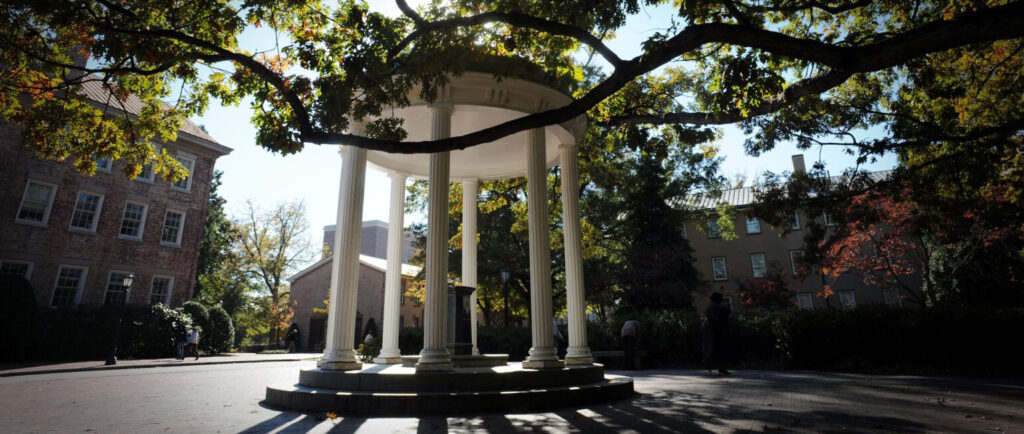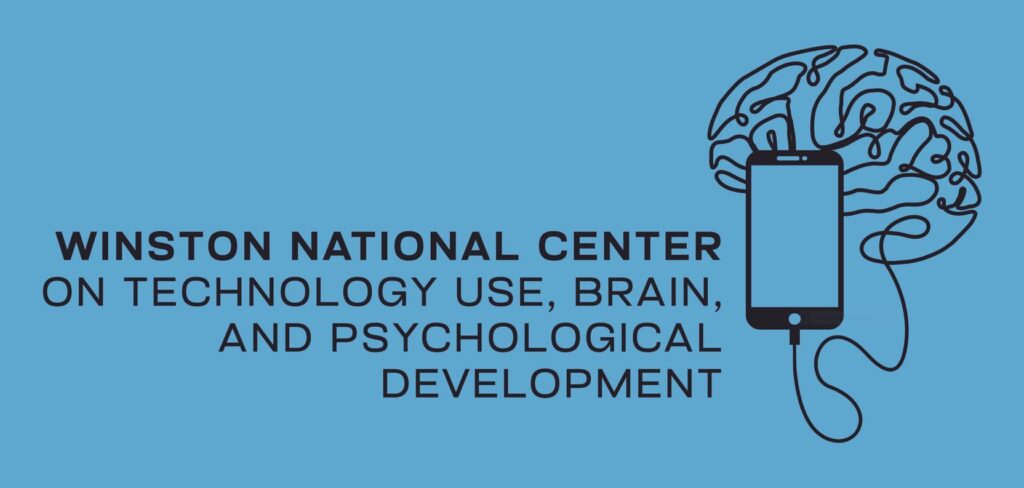A Meeting of the Minds: The Impact of Technology and Social Media on Adolescent Brain Development
Thursday, October 5, 2023

The Winston National Center on Technology Use, Brain and Psychological Development is a national leader in conducting scientific research on how technology, devices and social media impact adolescent brain development. The research is built on multi-modal, longitudinal data analysis, which makes the Winston Center a leader in this dynamic field.
Please see the article, “Association of Habitual Checking Behaviors on Social Media With Longitudinal Functional Brain Development,” published in JAMA by researchers in the department of psychology and neuroscience at UNC for more information.
Join top researchers, key stakeholders and philanthropists interested in making a positive impact in the lives of adolescents, the majority of whom are deeply entrenched in technological devices and social media. This will be an afternoon of scientific updates and substantive discussion about the emerging science demonstrating the nuanced impact of technology, devices and social media on brain development and the resulting psychological consequences.
12 p.m. Lunch and Conversation with Experts
Hyde Hall, University Room
176 E. Franklin Street, Chapel Hill, NC 27514
1:30 – 4:00 p.m. Scientific Updates and Roundtable Discussion
Graham Memorial Hall, GM-039
210 E. Franklin Street, Chapel Hill, NC 27514
Parking will be available in the Morehead Lot at 250 E. Franklin Street.
We hope you can join us as we learn about the latest scientific research from UNC’s Winston National Center on Technology Use, Brain and Psychological Development, engage in substantive conversation, and identify ways we can make a positive difference in the lives of children.
Please RSVP via the link in the email you received.
Speakers:
 Amanda Lenhart, M.A., is head of research at Common Sense Media. She has spent her career studying how technology affects human lives, with a special focus on families and children. Most recently, as the program director for health and data at Data & Society Research Institute, Lenhart investigated how social media platforms design for the digital well-being of youth. She began her career at the Pew Research Center, pioneering the Center’s work studying how teens and families use social and mobile technologies. Lenhart specializes in translating rigorous research for a broad national audience. Dedicated to public communication, she has testified before congressional subcommittees and the Federal Trade Commission. Her work has been featured in numerous national publications and broadcasts, including The New York Times, PBS Newshour and NPR’s All Things Considered. Lenhart serves on the advisory board to the Technology and Adolescent Mental Wellness initiative at the University of Wisconsin Department of Pediatrics and on the Technical Advisory Panel to the American Academy of Pediatrics Center on Social Media and Youth Mental Health. She also advises the Smithsonian Museum of Natural History on the development of a new exhibit on mobile phones.
Amanda Lenhart, M.A., is head of research at Common Sense Media. She has spent her career studying how technology affects human lives, with a special focus on families and children. Most recently, as the program director for health and data at Data & Society Research Institute, Lenhart investigated how social media platforms design for the digital well-being of youth. She began her career at the Pew Research Center, pioneering the Center’s work studying how teens and families use social and mobile technologies. Lenhart specializes in translating rigorous research for a broad national audience. Dedicated to public communication, she has testified before congressional subcommittees and the Federal Trade Commission. Her work has been featured in numerous national publications and broadcasts, including The New York Times, PBS Newshour and NPR’s All Things Considered. Lenhart serves on the advisory board to the Technology and Adolescent Mental Wellness initiative at the University of Wisconsin Department of Pediatrics and on the Technical Advisory Panel to the American Academy of Pediatrics Center on Social Media and Youth Mental Health. She also advises the Smithsonian Museum of Natural History on the development of a new exhibit on mobile phones.
 Margarita Louis-Dreyfus has been chairperson of the supervisory board of Louis Dreyfus Holdings B.V. since March 2011 and has served on this board since September 2007. She has also been a member of the supervisory board of Louis Dreyfus Companies Holdings B.V. since April 2011 and was appointed the chairperson of this company in 2013. Prior to this, Margarita Louis-Dreyfus held a number of positions in accounting, sales and marketing. She graduated with a diploma in accounting from the St. Petersburg School of Commerce. Margarita Louis-Dreyfus was married to Robert Louis-Dreyfus from 1992 until he passed away in 2009. She is the mother of five children and lives in Switzerland where the Company Louis Dreyfus Companies has its operational headquarters. Margarita Louis-Dreyfus has been the president of Louis Dreyfus Foundation since 2013.
Margarita Louis-Dreyfus has been chairperson of the supervisory board of Louis Dreyfus Holdings B.V. since March 2011 and has served on this board since September 2007. She has also been a member of the supervisory board of Louis Dreyfus Companies Holdings B.V. since April 2011 and was appointed the chairperson of this company in 2013. Prior to this, Margarita Louis-Dreyfus held a number of positions in accounting, sales and marketing. She graduated with a diploma in accounting from the St. Petersburg School of Commerce. Margarita Louis-Dreyfus was married to Robert Louis-Dreyfus from 1992 until he passed away in 2009. She is the mother of five children and lives in Switzerland where the Company Louis Dreyfus Companies has its operational headquarters. Margarita Louis-Dreyfus has been the president of Louis Dreyfus Foundation since 2013.
 Larissa May (Larz) is a digital wellbeing pioneer and founder of #HalfTheStory (HTS), the first non-profit dedicated to empowering the next generation’s relationship with social media. #HalfTheStory is an education-turned-ed tech nonprofit focused on adolescent digital wellbeing and the influence of technology on mental health. HTS’ evidence-based intervention, SocialMediaU (SMU) teaches key digital metacognition and emotional regulation skills, while empowering young people to understand and advocate for their human right to digital wellness. On the global stage, #HalfTheStory has led the narrative surrounding policy and youth-centric advocacy in the US, UK, EU, and UAE. From political figures, to leaders in technology, Larz’s work has permeated all facets of life and business. Larz has been dubbed a digital wellness activist by Time, Forbes, Refinery29, Good Morning America and NBC. Larz’s vision is to rebuild the next generation’s relationship with technology, and it starts with unpacking the toll it takes on our mental health, as well as our physical and psychological health. She believes that knowledge is power and a world that thrives – not just survives and relies – on technology is possible.
Larissa May (Larz) is a digital wellbeing pioneer and founder of #HalfTheStory (HTS), the first non-profit dedicated to empowering the next generation’s relationship with social media. #HalfTheStory is an education-turned-ed tech nonprofit focused on adolescent digital wellbeing and the influence of technology on mental health. HTS’ evidence-based intervention, SocialMediaU (SMU) teaches key digital metacognition and emotional regulation skills, while empowering young people to understand and advocate for their human right to digital wellness. On the global stage, #HalfTheStory has led the narrative surrounding policy and youth-centric advocacy in the US, UK, EU, and UAE. From political figures, to leaders in technology, Larz’s work has permeated all facets of life and business. Larz has been dubbed a digital wellness activist by Time, Forbes, Refinery29, Good Morning America and NBC. Larz’s vision is to rebuild the next generation’s relationship with technology, and it starts with unpacking the toll it takes on our mental health, as well as our physical and psychological health. She believes that knowledge is power and a world that thrives – not just survives and relies – on technology is possible.
 Mitch Prinstein, Ph.D., ABPP, is the co-director of the Winston National Center on Technology Use, Brain and Psychological Development and the John Van Seters Distinguished Professor of Psychology and Neuroscience at the University of North Carolina at Chapel Hill. He also serves as chief science officer of the American Psychological Association (APA). For over 25 years, and with continuous funding from the National Institutes of Health, Prinstein’s research has examined interpersonal models of internalizing symptoms and health risk behaviors among adolescents, with a specific focus on the unique role of off- and on-line peer relationships in the developmental psychopathology of depression and self-injury. At APA, he is responsible for leading the association’s science agenda and advocating for the application of psychological research and knowledge in settings including academia, government, industry and the law. Prior to APA and UNC, Prinstein served as the director of clinical psychology at UNC and Yale University. He is a board-certified clinical psychologist and scientist who has been studying child and adolescent mental health, publishing over 200 scientific manuscripts and 12 books. He is regularly featured as an expert in psychological science in consultation to government agencies and nonprofit associations, as a witness testifying before the U.S. Senate, in two TedX talks and within hundreds of media appearances around the world in outlets such as The New York Times, NPR, the Times (UK), and CNN, ABC, CBS and NBC.
Mitch Prinstein, Ph.D., ABPP, is the co-director of the Winston National Center on Technology Use, Brain and Psychological Development and the John Van Seters Distinguished Professor of Psychology and Neuroscience at the University of North Carolina at Chapel Hill. He also serves as chief science officer of the American Psychological Association (APA). For over 25 years, and with continuous funding from the National Institutes of Health, Prinstein’s research has examined interpersonal models of internalizing symptoms and health risk behaviors among adolescents, with a specific focus on the unique role of off- and on-line peer relationships in the developmental psychopathology of depression and self-injury. At APA, he is responsible for leading the association’s science agenda and advocating for the application of psychological research and knowledge in settings including academia, government, industry and the law. Prior to APA and UNC, Prinstein served as the director of clinical psychology at UNC and Yale University. He is a board-certified clinical psychologist and scientist who has been studying child and adolescent mental health, publishing over 200 scientific manuscripts and 12 books. He is regularly featured as an expert in psychological science in consultation to government agencies and nonprofit associations, as a witness testifying before the U.S. Senate, in two TedX talks and within hundreds of media appearances around the world in outlets such as The New York Times, NPR, the Times (UK), and CNN, ABC, CBS and NBC.

Eva Telzer, Ph.D., is the co-director of the Winston National Center on Technology Use, Brain and Psychological Development, and professor of psychology and neuroscience at the University of North Carolina at Chapel Hill. She is an associate editor at Child Development and Social Cognitive Affective Neuroscience and at UNC is the director of the Developmental Psychology Program. Telzer’s research examines how social and cultural processes shape adolescent brain development, with a focus on both prosocial and risk-taking behaviors, family and peer relationships, and the role of social media in youth’s lives. She has authored over 200 publications and has received numerous awards for her work including an Association for Psychological Science Rising Star Award, an early career award from the Society of Research on Adolescence, a Young Investigator Award from the Flux Congress Society for Developmental Cognitive Neuroscience, and the American Psychological Association Distinguished Scientific Award for Early Career Contribution to Psychology. She is regularly featured as an expert in psychological science in consultation to government agencies and nonprofit associations as well as media appearances in The New York Times, NPR, CNN, ABC, CBS and NBC.
 James “Jim” Winston, Jr., M.Litt., Ph.D., is the father of two teenage boys and a psychologist in private practice with decades of experience in the field of addiction. He holds a B.A. and Ph.D. from the University of North Carolina at Chapel Hill and a masters of letters from the University of Oxford. He is a trustee of the Winston Family Foundation and founder of the Winston Family Initiative, a coalition of psychologists, educators, advocates and neuroscience experts working to tackle teens’ addiction to “digital drugs” – smartphones – and address the potentially harmful effects of excessive device use on today’s youth. Winston began his career working with a drug program at a federal correctional institution before moving to Florida to serve as the clinical supervisor of an adolescent sex offender treatment program run by the University of Miami. He is passionate about using science-based education and research to support healthy technology use, especially for adolescents.
James “Jim” Winston, Jr., M.Litt., Ph.D., is the father of two teenage boys and a psychologist in private practice with decades of experience in the field of addiction. He holds a B.A. and Ph.D. from the University of North Carolina at Chapel Hill and a masters of letters from the University of Oxford. He is a trustee of the Winston Family Foundation and founder of the Winston Family Initiative, a coalition of psychologists, educators, advocates and neuroscience experts working to tackle teens’ addiction to “digital drugs” – smartphones – and address the potentially harmful effects of excessive device use on today’s youth. Winston began his career working with a drug program at a federal correctional institution before moving to Florida to serve as the clinical supervisor of an adolescent sex offender treatment program run by the University of Miami. He is passionate about using science-based education and research to support healthy technology use, especially for adolescents.


